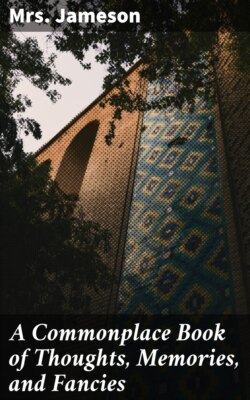Читать книгу A Commonplace Book of Thoughts, Memories, and Fancies - Mrs. (Anna) Jameson - Страница 14
На сайте Литреса книга снята с продажи.
5.
ОглавлениеI was reading to-day in the Notes to Boswell’s Life of Johnson that “it is a theory which every one knows to be false in fact, that virtue in real life is always productive of happiness, and vice of misery.” I should say that all my experience teaches me that the position is not false but true: that virtue does produce happiness, and vice does produce misery. But let us settle the meaning of the words. By happiness, we do not necessarily mean a state of worldly prosperity. By virtue, we do not mean a series of good actions which may or may not be rewarded, and, if done for reward, lose the essence of virtue. Virtue, according to my idea, is the habitual sense of right, and the habitual courage to act up to that sense of right, combined with benevolent sympathies, the charity which thinketh no evil. This union of the highest conscience and the highest sympathy fulfils my notion of virtue. Strength is essential to it; weakness incompatible with it. Where virtue is, the noblest faculties and the softest feelings are predominant; the whole being is in that state of harmony which I call happiness. Pain may reach it, passion may disturb it, but there is always a glimpse of blue sky above our head; as we ascend in dignity of being, we ascend in happiness, which is, in my sense of the word, the feeling which connects us with the infinite and with God.
And vice is necessarily misery: for that fluctuation of principle, that diseased craving for excitement, that weakness out of which springs falsehood, that suspicion of others, that discord with ourselves, with the absence of the benevolent propensities—these constitute misery as a state of being. The most miserable person I ever met with in my life had 12,000l. a year; a cunning mind, dexterous to compass its own ends; very little conscience, not enough, one would have thought, to vex with any retributive pang; but it was the absence of goodness that made the misery, obvious and hourly increasing. The perpetual kicking against the pricks, the unreasonable exigéance with regard to things, without any high standard with regard to persons—these made the misery. I can speak of it as misery who had it daily in my sight for five long years.
I have had arguments, if it be not presumption to call them so, with Carlyle on this point. It appeared to me that he confounded happiness with pleasure, with self-indulgence. He set aside with a towering scorn the idea of living for the sake of happiness, so called: he styled this philosophy of happiness, “the philosophy of the frying-pan.” But this was like the reasoning of a child, whose idea of happiness is plenty of sugar-plums. Pleasure, pleasurable sensation, is, as the world goes, something to thank God for. I should be one of the last to undervalue it; I hope I am one of the last to live for it; and pain is pain, a great evil, which I do not like either to inflict or suffer. But happiness lies beyond either pain or pleasure—is as sublime a thing as virtue itself, indivisible from it; and under this point of view it seems a perilous mistake to separate them.
